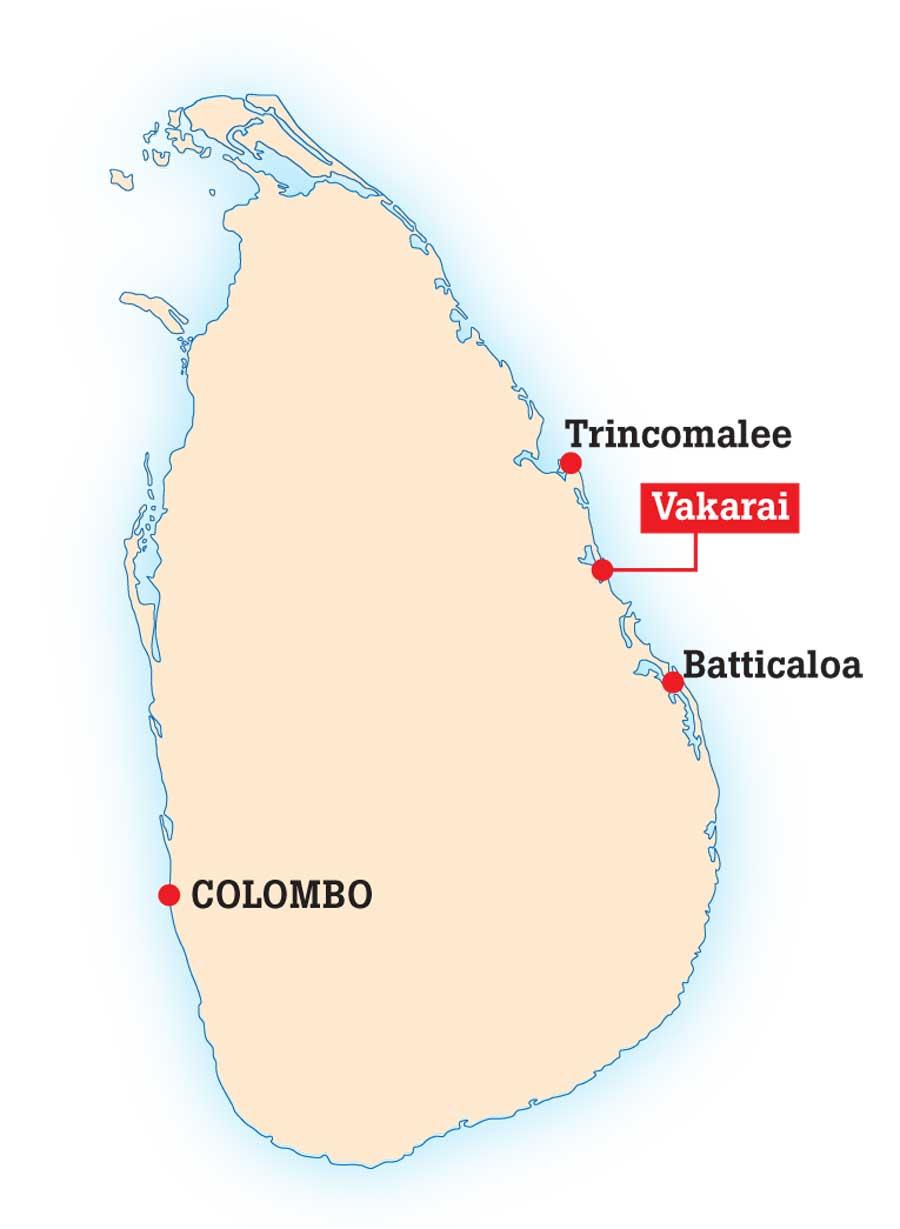Reply To:
Name - Reply Comment
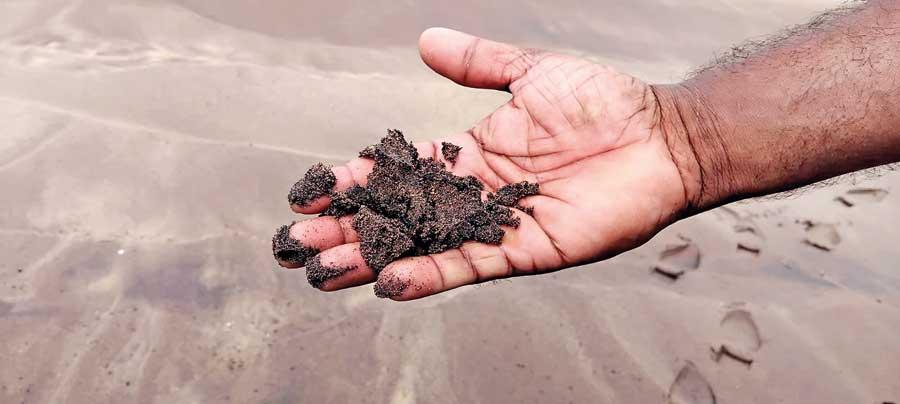
- The discovery of Ilmenite in Vakarai has attracted mining companies, bringing the promise of new jobs and economic growth
- Residents protest that removing sand for Ilmenite mining will cause seawater to seep into their lands
- Despite a Gazette notification being issued in 2016 declaring Vakarai and Kathiraveli as mangrove forest areas, a 3,000-acre area has been designated for shrimp farming
Paradise can be a fragile thing. In Vakarai, a Sri Lankan village where turquoise water laps against pristine beaches, a shimmering promise threatens to disrupt the idyllic scene. Ilmenite, a valuable mineral, lies buried beneath the sand, beckoning mining companies with the allure of progress. But for the villagers, the glittering opportunity comes laced with worry. Will this newfound wealth come at the cost of their way of life, their very connection to this coastal haven? The story of Vakarai is a microcosm of a global struggle – can development and preservation coexist, or will paradise be sacrificed on the altar of progress?
Vakarai, a peaceful coastal village in Sri Lanka, is undergoing big changes. Under its beautiful beaches lies a valuable resource called Ilmenite sand. The mineral is important for making many products, from paints to sunscreens.
The discovery of Ilmenite in Vakarai has attracted mining companies, bringing the promise of new jobs and economic growth.
Ilmenite is a titanium-iron oxide mineral. It is weakly magnetic. It’s black or steel-grey solid in colour. Ilmenite is the most important ore of titanium and the main source of titanium dioxide, which is used in paints, printing inks, fabrics, plastics, paper, sunscreen, food and cosmetics.
But this opportunity also comes with risks.
 Mining can harm the environment, threaten the clean beaches, marine life, and the way of life for local fishermen. People in Vakarai are hopeful about the benefits, but also worried about the damage mining might cause.
Mining can harm the environment, threaten the clean beaches, marine life, and the way of life for local fishermen. People in Vakarai are hopeful about the benefits, but also worried about the damage mining might cause.
As Vakarai faces these changes, the community must find a way to balance progress with protecting their homes.
In this report, Daily Mirror explores the exciting possibilities and the serious concerns of Ilmenite sand mining in Vakarai.
This report is based on a media tour- organised by the Centre for Environmental Justice (CEJ) – with the purpose of visiting the Vakarai area to inspect the situation.
People Uprising Movement Coordinator Thavaththiru Velan Swamigal, made a statement regarding what he called illegal shrimp farming and the Ilmenite sand mining project in this area.
The fishermen and residents of Vakarai, Batticaloa, held a peaceful protest march on July 5 from Kaddumurivu Junction to Puchchakkerni Post Office. They were demonstrating against the rapid removal of Ilmenite from the coastal regions and the negative impacts of shrimp farming on their livelihood and the environment.
The protesters claimed that these activities would destroy the local fishing habitat, threatening their way of life and damaging the environment.
While speaking to the media, Swamigal said that removing sand for Ilmenite mining will cause seawater to seep into their lands.
He claimed that the economic benefits for the people living in the area will be negatively affected.
The beach area between Vakarai and Kathiraveli is set to be given to a foreign multinational company, which stands to profit significantly from the project.
Velan Swamigal also claimed that the government representatives, including the President, Provincial Governor, Ministers, and Parliamentarians supporting these projects, stood to gain economic benefits for themselves and their families, rather than for the country, religion or ethnicity.
“We strongly condemn these projects,” he said.
“The government should make immediate decisions to stop them as they cause critical damage to the living areas of the Tamil people,” said Swamigal.
He also called on international communities, such as the International Monetary Fund (IMF), World Bank (WB), Asian Development Bank (ADB), United Nations (UN), and United Nations Environmental Authority (UNESCO), to apply pressure on the Sri Lankan Government when providing financial aid.
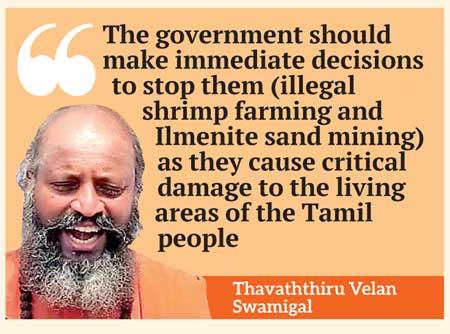 “The government is not listening to us, even though the courts have provided numerous justifications and decisions. Unfortunately, these rulings have not been implemented in Mannar. We are not against any religion, ethnicity, culture, or anything else. As human rights activists and civil society leaders, we are advocating for justice. Similarly, the Tamils living in the North Eastern province are also seeking justice for losses due to the 30 year civil war,” said Swamigal.
“The government is not listening to us, even though the courts have provided numerous justifications and decisions. Unfortunately, these rulings have not been implemented in Mannar. We are not against any religion, ethnicity, culture, or anything else. As human rights activists and civil society leaders, we are advocating for justice. Similarly, the Tamils living in the North Eastern province are also seeking justice for losses due to the 30 year civil war,” said Swamigal.
Meanwhile, the CEJ Chairperson Hemantha Withanage, underscored that the planned Ilmenite sand mining would affect a 30-metre-wide strip of land along a 40-kilometre stretch of beach.
He said this will destroy the fishing habitats of local Tamil communities.
Withanage pointed out that once the coastal area is dug, seawater would seep 30 metres inland.
He also mentioned that this Ilmenite sand mining project isn’t the only one in the eastern and northern coasts. There is an ongoing project in Mannar, and mining for Ilmenite is already happening in the Kokkilai area. Another project is underway in Akkaraipattu.
“Two new projects are on the horizon. One is set to be implemented from Kinniya to Muttur, and the second from Nilaveli to Kumburupiddy, as proposed by the Eastern Province governor and included in the district’s development committee. These projects, like others before them, threaten to destroy fishing habitats and the coastal zone,” he said.
Withanage pointed out that under the existing policy, anyone could engage in mining and export two-thirds of the raw materials out of the country, leaving Sri Lanka with little benefit except for royalty payments.
He claimed that the necessity of conducting an Environmental Impact Assessment (EIA) before implementing any project, along with the need for a value-added system.
He claimed that a local company based in Colombo and Kandalama in Dambulla, is involved in these mining activities.
The initial EIA for the project from Pottuvil to Polikandy was conducted in 2012.
Environmental reports are valid for three years, and after this period, a new assessment and approval are required. However, the company has yet to obtain new approval since the initial one.
The local company must listen to the voices of the local people and respect their rights. According to the constitution and environmental laws in the country, locals have the right to oppose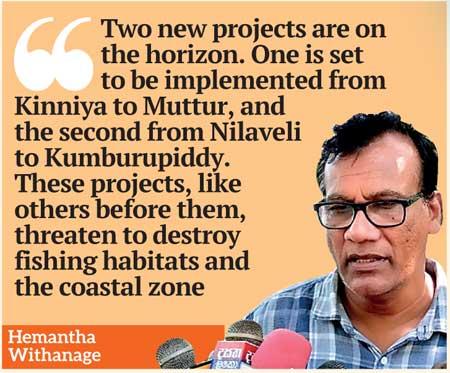 such projects.
such projects.
The second contentious project is shrimp farming in the Vakarai area.
A Gazette notification issued in 2016 declared Vakarai and Kathiraveli as mangrove forest areas under the forest department.
Despite this, a 3,000-acre area has been designated for shrimp farming.
Withanage pointed out that over 3,000 fishing families and more than 4,000 farmers live in these mangrove areas. Additionally, over 27,000 cattle graze in these lands.
To understand the impact of shrimp farming, people should visit the Puttalam Lagoon area, where over 3,000 hectares were destroyed after implementing shrimp farming, affecting more than 2,500 fishermen.
In 20 years, fewer than 100 fishermen have managed to survive in the Puttalam Lagoon.
Withanage urged government officials to visit Puttalam Lagoon to get an understanding of the impending consequences of a similar project in Vakarai.
The local community has the right to protest. Before implementing such projects, the government needs to study all environmental, social, and economic impacts.
The natural habitat provides significant benefits to the local community. Sri Lanka has only about 12,000 hectares of mangroves, and approximately 1,000 hectares will be destroyed by these projects. The CEJ stands in complete opposition to them.
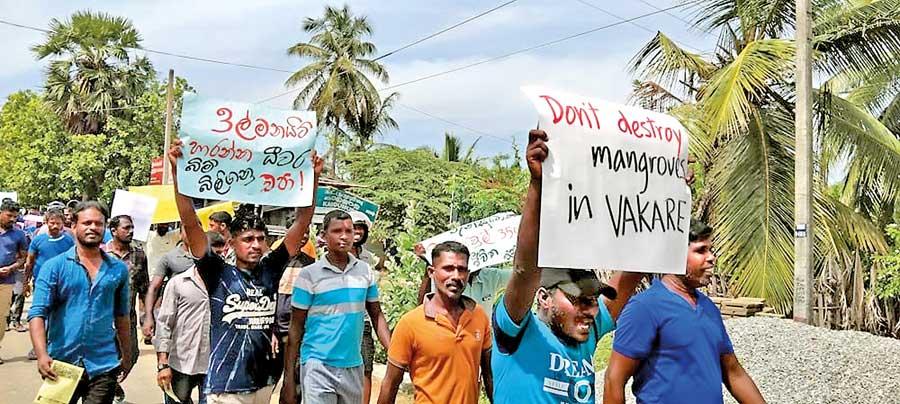
The fishermen and residents of Vakarai, Batticaloa, held a peaceful protest march on July 5
Municipal Council Secretary refuses to comment
The media team visited the Batticaloa Municipal Council (BMC) to obtain more details, but the Municipal Council Secretary refused to comment on the issues. However, he confirmed the ongoing issues in the Vakarai area.
He also mentioned receiving threats from higher officials pressuring him to allocate the mangrove and beach areas for shrimp farming and Ilmenite sand mining projects.
Meanwhile, the Homeland Democratic Party (HDP) Executive National Leader, Nimalan Vishvanathan, told the Daily Mirror that international companies should be invited through a transparent tender.
Ilmenite is a valuable resource for Sri Lanka, and electronic equipment manufacturing companies could offer higher amounts that benefit the country.
Unfortunately, the tender was awarded to a local company that profits solely from it.
The people in the Vakarai area claimed that the senior government officials in the Northern and Eastern Provinces must be held responsible.
“We also know the person involved with these projects, but we cannot go against him due to threats to our livelihoods and families. Most of our lands are under him,” they said.
The people of Vakarai demanded that the government must address their concerns and provide justice and sustainable solutions.
